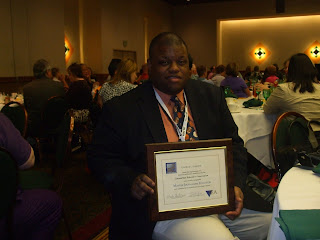

We're just a little more than a week away from
Black in America 2. And, it seems CNN Correspondent Soledad O'Brien has picked up a new name-- "Soledad on Solutions" or "Soledad with Solutions."
That's how anchor Don Lemon referred to O'Brien in introducing an excerpt from the second year of this two-night documentary project focused on the state of black Americans. (See photos of the two broadcast journalists from the CNN talent Web site)
While tonight's piece on African-American males and mental illness was interesting, I've been particularly interested in the apparent emphasis on race & diversity topics in Lemon's weekend program.
Lemon's CNN Newsroom Line-up
Along with Barack Obama's visit to Ghana, the disturbing of Emmett Till's grave, the Michael Jackson death investigation, one might suspect that an usually high number of Lemon's stories (the ones in his newscasts) have to do with African Americans. Even in the interview with a young man allegedly turned away from a swimming pool because of his race, Lemon identified with the obvious racial component of this story.
One has to wonder if tonight's CNN Newsroom line-up is simply a coincidence or if there is some deliberate attempt on Lemon's part as an anchor to ensure that these stories get covered adequately.
It should be noted that a lot of these stories have been on the air all day, not just during Lemon's newscasts. So, it may be just a day for these types of stories.
I think it's "interesting" to note the line-up of stories tonight and even an extended interview coming up on the 10 p.m. (EDT) show with NAACP CEO Ben Jealous, about whom
I've written here previously.
I will be watching this evening to see if the interviewer (presumably either Don Lemon or Newsroom Morning anchor T.J. Holmes, an African-American) makes a difference in the direction that interview on the 100th anniversary of NAACP takes.
Black in America: An EVERYDAY Story
A point that I made in my writing on CNN's original Black in America documentary last July was the importance of continuous "everyday" news coverage of the concerns of AFrican-Americans. In other words, the "Black Experience" is bigger than what can be contained in four hours of coverage (or eight hours, if you combine the 2008 and 2009 installments of Black in America)
As a television producer, I know firsthand, it's who's behind the scenes that makes the difference in what gets covered.
Until today I had not paid much attention to Don Lemon, especially since he was moved a year or so ago to the weekend shift (I believe he swapped places with CNN's Rick Sanchez). Some might view this shift as a demotion for Lemon. But, maybe not.
I recall the weekend evening- CNN Newsroom shows a couple years ago when Rick Sanchez would add an extra measure of "culture" to his view of stories that connect with his background as a Cuban American. (Sanchez somehwat pioneered the use of Twitter and Facebook during TV news programs during the most recent presidential campaign.)
Could Don Lemon's "perspective" as an African Americans do the same as Rick Sanchez has done for those of Cuban/Latino/Hispanic descent?

Lemon, who
before his current job at CNN, worked as network correspondent and local news anchor in several markets, was
written about earlier this week on The Huffington Post, for his defense of the over-abundance of Michael Jackson coverage.
I'll have to admit how surprised I was last Saturday evening to see so much emphasis placed on Jackson. Last Saturday (July 4), I tuned in to CNN looking for live coverage Nashville police neweers (news conferences) about what turned out to be Steve McNair's murder.
Instead, Lemon was tossing to interviews with people at the Essence Music Festival (Queen Latifah to be one) talking about Michael Jsckson.
Now that I've read
Lemon's comments on CNN's Reliable Sources, I can see why. Either he's touting the company (CNN) line about a decision to emphasize Michael Jackson or he REALLY sees Michael Jackson as an "accidental civil rights leader." Really?
As a life member of the 100-year-old NAACP and a former NAACP Youth leader, I would take issue with this characterization. It will be interesting to see if Michael Jackson comes up in Lemon's interview with Ben Jealous.
The Bottomline on Lemon and O'Brien
My point in this long, somewhat rambling, post-- Don Lemon and Soledad O'Brien seem to be (however unintentional it might be) taking seriously the goal of reflecting the black experience in "everyday" presentation of the news.
Make no mistake-- O'Brien is all about drawing viewers to the project on which she and her army of producers have worked for more than a year, Black in America 2.
It's a business folks.
And, the data show that we African-Americans watch more TV than other racial groups. So, it's probably not a bad idea to give us a little bit more attention.
More on "Black in America 2" in the next few days as we set the stage for an event related to Black in America 2.

 The view of downtown JAX from my hotel room wasn't that bad either.
The view of downtown JAX from my hotel room wasn't that bad either. 









































